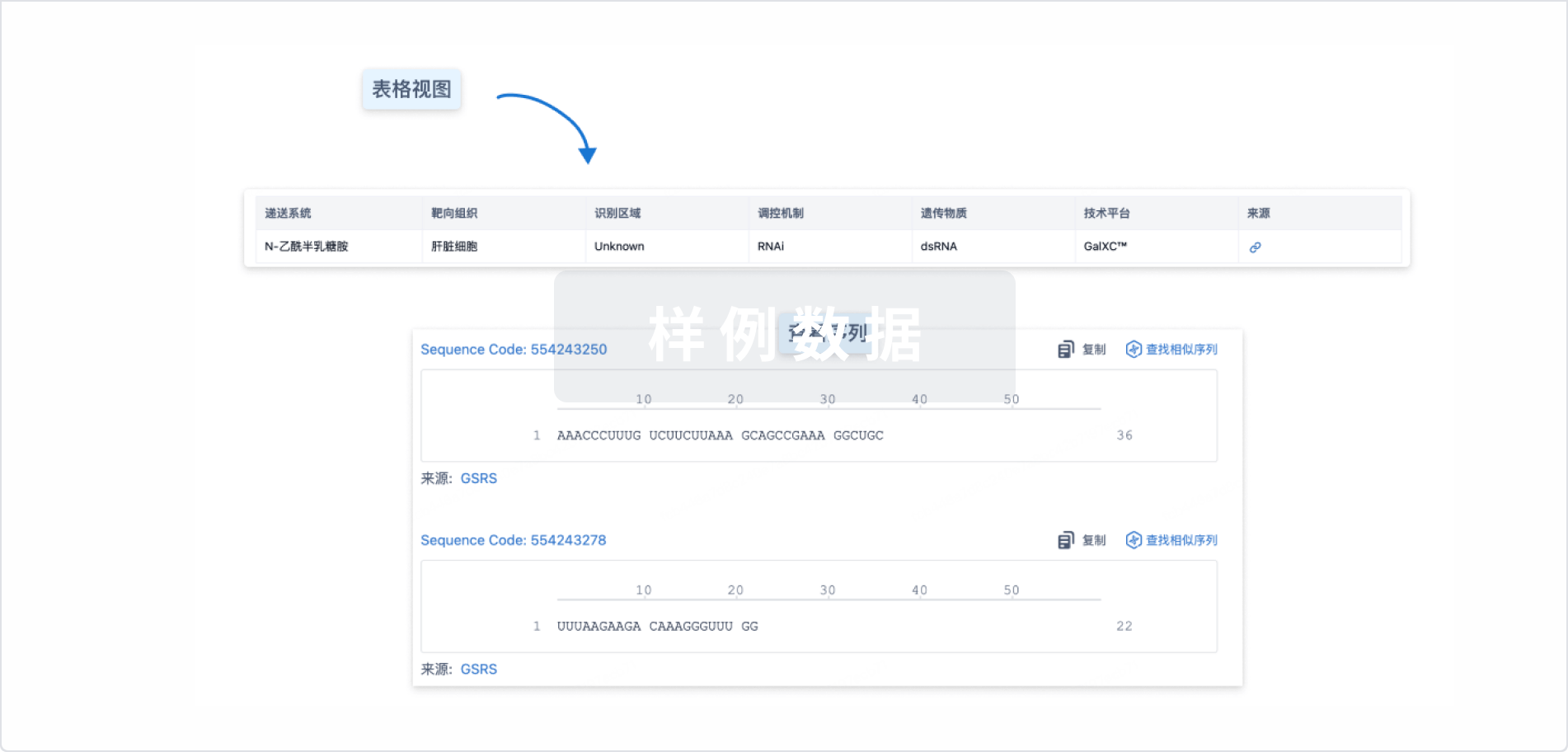预约演示
更新于:2026-02-07
DV-281
更新于:2026-02-07
概要
基本信息
非在研机构- |
权益机构- |
最高研发阶段临床2期 |
首次获批日期- |
最高研发阶段(中国)- |
特殊审评- |
登录后查看时间轴
结构/序列
使用我们的RNA技术数据为新药研发加速。
登录
或

关联
1
项与 DV-281 相关的临床试验NCT03326752
Phase 1b Dose Escalation and Dose Expansion Trial of DV281 in Combination With an Approved Anti-PD-1 Inhibitor in Subjects With Advanced Non-Small Cell Lung Cancer
This open-label, multicenter, dose-escalation and expansion trial is designed to evaluate the safety and preliminary efficacy of inhaled DV281 in combination with nivolumabfor the treatment of NSCLC and to select a recommended phase 2 dose (RP2D).
开始日期2017-09-20 |
申办/合作机构 |
100 项与 DV-281 相关的临床结果
登录后查看更多信息
100 项与 DV-281 相关的转化医学
登录后查看更多信息
100 项与 DV-281 相关的专利(医药)
登录后查看更多信息
2
项与 DV-281 相关的文献(医药)2021-08-15·Clinical cancer research : an official journal of the American Association for Cancer Research1区 · 医学
A Phase Ib Open-Label, Multicenter Study of Inhaled DV281, a TLR9 Agonist, in Combination with Nivolumab in Patients with Advanced or Metastatic Non–small Cell Lung Cancer
1区 · 医学
Article
作者: Janatpour, Mary J. ; Bazhenova, Lyudmila ; Leach, Joseph ; Candia, Albert ; Johnson, Melissa ; Janssen, Robert ; Coffman, Robert L. ; Spira, Alexander I. ; Gamelin, Erick ; Chow, Laura Q.M. ; Garon, Edward B. ; Cummings, Amy L.
Abstract:
Purpose::
Although PD-(L)1 inhibitors have shown efficacy in advanced/metastatic non–small cell lung cancer (NSCLC), many patients do not respond to this treatment and more effective combinations with acceptable toxicities are needed. To assess the potential benefit of combining localized innate immune stimulation with checkpoint blockade, the TLR9 agonist DV281 was combined with nivolumab in a phase Ib study.
Patients and Methods::
Patients after one or two prior lines of systemic therapy were enrolled in a dose-escalation study with a 3+3 design. DV281 was administered via inhalation in five dose cohorts at 1 to 25 mg; nivolumab 240 mg was administered intravenously every 2 weeks. Safety, tolerability, pharmacodynamics, and response to treatment were assessed.
Results::
Twenty-six patients with advanced NSCLC enrolled. Baseline programmed death ligand 1 (PD-L1) expression was present in 16 patients (61.5%); 21 (80.7%) had received previous anti–PD-1/PD-L1. Thirteen patients (50%) had stable disease, nine (34.6%) had progressive disease, and four (15.4%) were not evaluable. Median duration of disease control was 124 days. Adverse events were seen in 16 patients (61.5%), mostly grade 1/2 chills, fatigue, flu-like symptoms, diarrhea, and rash; there was only one grade 3 adverse event (dyspnea). Pharmacodynamic assessment, measured by IFN- inducible gene expression, showed target engagement in all dose cohorts. Systemic pharmacodynamic responses plateaued in the 2 highest dose cohorts.
Conclusions::
DV281 with nivolumab was well tolerated with target engagement observed at every dose. Pharmacodynamic advantages at doses above 10 mg were unclear. The long duration of disease control in 50% of patients suggests clinically relevant activity in this population of heavily pretreated patients.
2019-01-01·International immunopharmacology2区 · 医学
Preclinical development of the TLR9 agonist DV281 as an inhaled aerosolized immunotherapeutic for lung cancer: Pharmacological profile in mice, non-human primates, and human primary cells
2区 · 医学
Article
作者: Kachura, Melissa A ; Renn, Alex ; Coffman, Robert L ; Traquina, Paula ; Campbell, John D ; Kell, Sariah A
CpG-motif-containing oligodeoxynucleotides (CpG-ODN) activate innate immunity through Toll-Like Receptor (TLR) 9 signaling and generate local immune responses when delivered directly to the lung. Herein we describe pharmacological studies in mice, cynomolgus monkeys, and in human primary cells which support the development of DV281, a C-class CpG-ODN, as an inhaled aerosolized immunotherapeutic for lung cancer to be combined with an inhibitor of the anti-programmed cell death protein 1 (PD‑1) immune checkpoint. In vitro, DV281 potently induced Interferon (IFN)‑α from monkey and human peripheral blood mononuclear cells (PBMCs), stimulated interleukin‑6 production and proliferation in human B cells, and induced TLR9-dependent cytokine responses from mouse splenocytes. Intranasal delivery of DV281 to mice led to substantial but transient cytokine and chemokine responses in the lung. Lung responses to repeated intranasal DV281 were partially to fully reversible 2 weeks after the final dose and were absent in TLR9-deficient mice. Single escalating doses of aerosolized DV281 in monkeys induced dose-dependent induction of IFN-regulated genes in bronchoalveolar lavage cells and blood. In a repeat-dose safety study in monkeys, inhaled DV281 was well-tolerated, and findings were mechanism of action-related and non-adverse. Co-culture of human PBMC with DV281 and anti-PD‑1 antibody did not augment cytokine or cellular proliferation responses compared to DV281 alone, indicating that the combination did not lead to dysregulated cytokine responses. These studies support clinical development of inhaled aerosolized DV281 as a combination therapy with anti-PD‑1 antibody for lung cancer immunotherapy.
2
项与 DV-281 相关的新闻(医药)2025-12-27
·华盛通
奥麦罗制药(OMER) 0
SMX (Security Matters) Public Ltd Co Ordinary Shares - Class A(SMX) 0
HYCROFT MINING HOLDING CORPORATION(HYMC) 0华盛资讯2025年12月27日讯,本周道琼斯指数涨幅1.2%,报48710.97点;纳斯达克指数涨幅1.22%,报23593.1点;标普500指数涨幅1.4%,报6929.94点。發仔梳理了每周美股涨跌幅Top10榜单,供投资者参考。Omeros Corporation $OMER 是一家位于华盛顿的生物制药公司,专注于开发针对补体系统相关疾病和紊乱的治疗方案。补体系统作为人体免疫系统的关键组成部分,由一组特殊蛋白质构成,在抵御病原体和清除受损细胞方面发挥重要作用。然而,补体系统的失调可能导致多种疾病,包括自身免疫性疾病、慢性炎症、血栓性微血管病和癌症。该公司正积极推进多个开发项目,旨在解决这些与补体系统相关的健康问题。消息面上,近期该公司宣布,美国食品药品监督管理局(FDA)已批准 YARTEMLEA(纳索普利单抗-wuug)用于治疗造血干细胞移植相关性血栓性微血管病(TA-TMA),这是一种由补体凝集素途径激活引起的、通常会致命的干细胞移植并发症。YARTEMLEA 是首个也是唯一获批的凝集素通路抑制剂。YARTEMLEA 选择性抑制 MASP-2(凝集素途径的效应酶),阻止通路激活,同时保留对宿主防御重要的经典和替代补体功能。YARTEMLEA 获批用于成人以及两岁及以上儿童。Hycroft Mining Holding Corporation $HYMC 是一家美国黄金和白银生产商,于2017年8月28日在特拉华州注册成立。公司主要经营位于内华达州北部的Hycroft矿,该矿区被认为是世界级矿藏。Hycroft矿是全球20大原生金矿之一,同时也是美国第二大金矿,具有重要的战略地位和经济价值。公司通过开发这一优质资产,在贵金属行业占据重要地位。消息面上,近期该公司表示,其在内华达州Hycroft矿的Vortex银矿系统中的勘探钻探计划证实了高品位银的连续性,并发现了迄今为止确认的最高品位。该公司表示,该计划最初包括使用两台钻机进行的14,500米岩心钻探,并计划在2026年增加两台岩心钻机。Dynavax Technologies Corporation $DVAX 是一家专注于利用人体免疫反应的生物制药公司。该公司成立于1996年,2000年在特拉华州重组。其主要产品HEPLISAV-B于2017年获FDA批准,用于预防成人乙型肝炎感染。公司研发重点为刺激先天性免疫反应,并探索与其他免疫调节剂联合治疗癌症。目前,其主要研究产品SD-101正进行二期临床试验,DV281处于一期安全性研究阶段。消息面上,法国制药巨头赛诺菲安万特周三宣布,将以约22亿美元(19亿欧元)现金收购美国疫苗公司德纳维制药。这笔交易将使赛诺菲获得一款已获批的乙型肝炎疫苗。赛诺菲表示,预计该项收购将于2026年第一季度完成,并将使用现有现金储备支付,且该交易不会影响其2025年的财务指引。發仔统计了每周美股涨跌幅Top10,具体名单如下:此内容由AI大模型工具“华盛天玑”生成,并由华盛内容团队编辑审核。风险提示:投资涉及风险,证券价格可升亦可跌,更可变得毫无价值。投资未必一定能够赚取利润,反而可能会招致损失。过往业绩并不代表将来的表现。在作出任何投资决定之前,投资者须评估本身的财政状况、投资目标、经验、承受风险的能力及了解有关产品之性质及风险。个别投资产品的性质及风险详情,请细阅相关销售文件,以了解更多资料。倘有任何疑问,应征询独立的专业意见。
疫苗并购临床2期临床1期引进/卖出
2025-12-25
·华盛通
奥麦罗制药(OMER) 0
AMCI Acquisition(AMCI) 0
Euda Health Holdings Limited - Ordinary Shares(EUDA) 0编者按:《美股牛股》栏目旨在追踪每日美股市场涨幅TOP10牛股,紧抓涨势迅猛的个股,助力投资者快速把握美股交易机会。华盛资讯2025年12月25日讯,截至美东时间周三收盘,道琼斯指数涨幅0.6%,报48731.16点;纳斯达克指数涨幅0.22%,报23613.31点;标普500指数涨幅0.32%,报6932.05点。發仔梳理了每日美股涨幅Top10榜单,供投资者参考。以下为隔夜美股涨幅靠前的个股:Omeros Corporation是一家位于华盛顿的生物制药公司,专注于开发针对补体系统相关疾病和紊乱的治疗方案。补体系统作为人体免疫系统的关键组成部分,由一组特殊蛋白质构成,在抵御病原体和清除受损细胞方面发挥重要作用。然而,补体系统的失调可能导致多种疾病,包括自身免疫性疾病、慢性炎症、血栓性微血管病和癌症。该公司正积极推进多个开发项目,旨在解决这些与补体系统相关的健康问题。消息面上,该公司宣布,美国食品药品监督管理局(FDA)已批准 YARTEMLEA(纳索普利单抗-wuug)用于治疗造血干细胞移植相关性血栓性微血管病(TA-TMA),这是一种由补体凝集素途径激活引起的、通常会致命的干细胞移植并发症。YARTEMLEA 是首个也是唯一获批的凝集素通路抑制剂。YARTEMLEA 选择性抑制 MASP-2(凝集素途径的效应酶),阻止通路激活,同时保留对宿主防御重要的经典和替代补体功能。YARTEMLEA 获批用于成人以及两岁及以上儿童。Dynavax Technologies Corporation是一家专注于利用人体免疫反应的生物制药公司。该公司成立于1996年,2000年在特拉华州重组。其主要产品HEPLISAV-B于2017年获FDA批准,用于预防成人乙型肝炎感染。公司研发重点为刺激先天性免疫反应,并探索与其他免疫调节剂联合治疗癌症。目前,其主要研究产品SD-101正进行二期临床试验,DV281处于一期安全性研究阶段。消息面上,法国制药巨头赛诺菲安万特周三宣布,将以约22亿美元(19亿欧元)现金收购美国疫苗公司德纳维制药。这笔交易将使赛诺菲获得一款已获批的乙型肝炎疫苗。赛诺菲表示,预计该项收购将于2026年第一季度完成,并将使用现有现金储备支付,且该交易不会影响其2025年的财务指引。Sidus Space, Inc.是一家成立于2012年的空间服务公司,专注于商业卫星领域。2021年,公司在特拉华州完成改制。其业务涵盖卫星设计、制造、发射和数据收集等方面,致力于展示新技术并提供数据分析服务。公司服务范围广泛,包括多学科工程设计、精密加工制造、电子组件生产、3D打印、卫星制造及相关支持服务等。客户群体涉及商业航天、航空航天、国防及政府机构等多个领域。消息面上,公司被选为美国导弹防御局SHIELD IDIQ计划的合同获得者,这份总限额高达1510亿美元的合同将支持Golden Dome导弹防御战略,涵盖多领域威胁防御。此外,公司宣布了新股发行计划,拟以每股1.30美元的价格发行约1920万股A类股票,预计筹集2500万美元用于业务发展。發仔统计了每日美股涨幅Top10,具体名单如下:数据截止至:美东时间12月24日收盘此内容由AI大模型工具“华盛天玑”生成,并由华盛内容团队编辑审核。风险提示:投资涉及风险,证券价格可升亦可跌,更可变得毫无价值。投资未必一定能够赚取利润,反而可能会招致损失。过往业绩并不代表将来的表现。在作出任何投资决定之前,投资者须评估本身的财政状况、投资目标、经验、承受风险的能力及了解有关产品之性质及风险。个别投资产品的性质及风险详情,请细阅相关销售文件,以了解更多资料。倘有任何疑问,应征询独立的专业意见。
并购临床2期疫苗加速审批
100 项与 DV-281 相关的药物交易
登录后查看更多信息
研发状态
10 条进展最快的记录, 后查看更多信息
登录
| 适应症 | 最高研发状态 | 国家/地区 | 公司 | 日期 |
|---|---|---|---|---|
| 非小细胞肺癌 | 临床2期 | - | - | |
| 晚期非小细胞肺癌 | 临床1期 | 美国 | 2017-09-20 |
登录后查看更多信息
临床结果
临床结果
转化医学
使用我们的转化医学数据加速您的研究。
登录
或

药物交易
使用我们的药物交易数据加速您的研究。
登录
或

核心专利
使用我们的核心专利数据促进您的研究。
登录
或

临床分析
紧跟全球注册中心的最新临床试验。
登录
或

批准
利用最新的监管批准信息加速您的研究。
登录
或

特殊审评
只需点击几下即可了解关键药物信息。
登录
或

生物医药百科问答
全新生物医药AI Agent 覆盖科研全链路,让突破性发现快人一步
立即开始免费试用!
智慧芽新药情报库是智慧芽专为生命科学人士构建的基于AI的创新药情报平台,助您全方位提升您的研发与决策效率。
立即开始数据试用!
智慧芽新药库数据也通过智慧芽数据服务平台,以API或者数据包形式对外开放,助您更加充分利用智慧芽新药情报信息。
生物序列数据库
生物药研发创新
免费使用
化学结构数据库
小分子化药研发创新
免费使用
